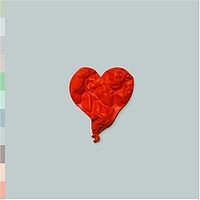Kanye West.
The mere mention of his name polarizes hip-hop fans and pop culture followers the same; there's two very distinct sides of Kanye, but they're wound together by a common thread...
Unparalleled arrogance.
While that's not only the norm in hip-hop -- it's usually encouraged -- there's something grating about the Chi-town rapper anointing himself the "voice of the generation" and whining at award shows about what he "deserved." So while there's the acclaimed artist (rapper and producer) side of Mr. West, there's the self-aggrandizing public pariah as well. Many are willing to forgive his personality shortcomings because of the music he makes.
The release of 808s & Heartbreak, then, puts him at an interesting crossroads. Forgoing the charm of "Through the Wire" that he's ridden through three albums, Kanye has changed gears completely. A leading proponent of the Auto-Tune wave that T-Pain has helped sweep through hip-hop, he's gone all the way. Most of 808s 12 songs rely heavily on it. The good news, though, is that Kanye doesn't use it as a crutch, but as a vehicle to parlay his creative expression in a new and different way.
Simply put -- he's taking chances that no one else right now would be willing to take.
Look no further than "Heartless" to see how thoroughly that can pay off. The song is almost bare of production; the two centerpieces are Kanye's (slightly altered voice) and a beat anchored by a most unusual chain -- the Japanese flute. The whimsical chugging of the flute and Kanye's synthesized vocals make for an odd but entrancing combination that backdrops a story about a failed relationship. The heart-on-sleeve feel of lines like "In the night, I hear 'em talk, the coldest story ever told / Somewhere far along this road, he lost his soul to a woman so heartless" make West feel more real than ever before. The irony of it all is that West feels more human, more emotive with the robotic vocal effect than he ever did rapping. It's not the last time Kanye lets up his guard, either.
"Coldest Winter" is a touching tribute to his late mother, and Kanye lets his emotions take hold here like never before. The thick, pulsing drum resonates tastefully over melodic synth currents as Kanye asks "goodbye my friend, will I ever love again?" None of the grandstanding that West is so known for matters here, nor does the soapbox to which he often affixes himself; it's a rare, real bit of human emotion that many artists, let alone rappers, don't offer a window to.
Continuing the trend of understated production is "Amazing," a piano-driven foray accompanied by unmistakable go-getta, Young Jeezy. Kanye's vocals are perfectly suited to the mid-paced rhythm, but it's Jeezy's deep rasp that steals the show. Forceful without being loud, Jeezy offers a nice change of pace from the Auto-Tune that laces almost every other song.
Not every collaboration is a success, however. Lil Wayne -- quite the fan of Auto-Tune himself -- makes an entirely forgettable appearance on "See You in My Nightmares." His aggressive, off-kilter delivery is far less menacing with computer assistance, and Kanye does nothing to save the song from the wallows of mediocrity. "Robocop" also missed the mark. West sounds completely uninspired, and not even the layers of production on the song can save it. Whereas the production choices on most of 808s offer a wealth of well put-together sounds or an endearing simplicity, "Robocop" is a mess of chances that went wildly astray.
As much as it pains me, I have to commend Kanye for not only the scope of the album, but the limb he went out on in many of these songs. The creative successes like "Heartless" and "Streetlights" far outweigh the negative, and at long last, it feels like West is truly being real.
Since hitting the scene, Kanye has adamantly painted himself as an "artist." Now, he has the album to prove it.
